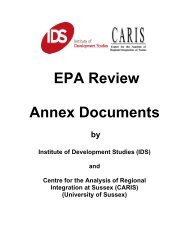The Impact of Energy Use on Poor Urban Livelihoods in ... - DfID
The Impact of Energy Use on Poor Urban Livelihoods in ... - DfID
The Impact of Energy Use on Poor Urban Livelihoods in ... - DfID
Create successful ePaper yourself
Turn your PDF publications into a flip-book with our unique Google optimized e-Paper software.
A Study <str<strong>on</strong>g>of</str<strong>on</strong>g> the <str<strong>on</strong>g>Impact</str<strong>on</strong>g> <str<strong>on</strong>g>of</str<strong>on</strong>g> <str<strong>on</strong>g>Energy</str<strong>on</strong>g> use <strong>on</strong> <strong>Poor</strong> Women/Girls <strong>Livelihoods</strong> <strong>in</strong> Arusha, Tanzania<br />
about the type <str<strong>on</strong>g>of</str<strong>on</strong>g> energy to be used is less clear cut, with men sometimes mak<strong>in</strong>g the<br />
decisi<strong>on</strong> and sometimes the decisi<strong>on</strong> be<strong>in</strong>g made jo<strong>in</strong>tly.<br />
This study f<strong>in</strong>ds that to achieve effective and susta<strong>in</strong>able changes <strong>in</strong> the household<br />
energy process and hence energy roles, resp<strong>on</strong>sibilities and rights, and thus move<br />
towards gender equality and women’s empowerment, it will be necessary, <strong>in</strong> view <str<strong>on</strong>g>of</str<strong>on</strong>g><br />
the exist<strong>in</strong>g cultural paradigm, to work with both women and men. Further because <str<strong>on</strong>g>of</str<strong>on</strong>g><br />
the unique energy-use f<strong>in</strong>gerpr<strong>in</strong>t <strong>in</strong> each locality it is necessary for any changes to<br />
be c<strong>on</strong>text sensitive. Two sets <str<strong>on</strong>g>of</str<strong>on</strong>g> issues have been identified which, if changed,<br />
could lead to the use <str<strong>on</strong>g>of</str<strong>on</strong>g> more efficient time sav<strong>in</strong>g energy not <strong>on</strong>ly by women but also<br />
by men and others <strong>in</strong> the home. <str<strong>on</strong>g>The</str<strong>on</strong>g> first is c<strong>on</strong>cerned with <strong>in</strong>creas<strong>in</strong>g the knowledge<br />
and understand<strong>in</strong>g <str<strong>on</strong>g>of</str<strong>on</strong>g> the performance <str<strong>on</strong>g>of</str<strong>on</strong>g> various fuels and how best to use them.<br />
<str<strong>on</strong>g>The</str<strong>on</strong>g> sec<strong>on</strong>d relates to changed approaches around energy <strong>in</strong> the community and<br />
government sectors.<br />
<str<strong>on</strong>g>The</str<strong>on</strong>g>re is anecdotal evidence from this research that men are more will<strong>in</strong>g to share <strong>in</strong><br />
energy related tasks when the process is easier, cleaner and quicker. 94 So the use<br />
<str<strong>on</strong>g>of</str<strong>on</strong>g> modern fuels would appear to be the ideal if there is to be a more equal shar<strong>in</strong>g<br />
between men and women <str<strong>on</strong>g>of</str<strong>on</strong>g> household energy related tasks. Unfortunately for the<br />
reas<strong>on</strong>s discussed earlier, households <strong>in</strong> the study area, <strong>in</strong> the short and probably<br />
medium term, are likely to have limited access to electricity the most desired <str<strong>on</strong>g>of</str<strong>on</strong>g><br />
modern fuels. Nevertheless it is the c<strong>on</strong>tenti<strong>on</strong> <str<strong>on</strong>g>of</str<strong>on</strong>g> this report that greater gender<br />
equality and women’s empowerment <strong>in</strong> the energy process can be achieved through<br />
mak<strong>in</strong>g energy a focus <str<strong>on</strong>g>of</str<strong>on</strong>g> community <strong>in</strong>terest and work<strong>in</strong>g with men and women to<br />
<strong>in</strong>crease the knowledge and understand<strong>in</strong>g <str<strong>on</strong>g>of</str<strong>on</strong>g> the performance <str<strong>on</strong>g>of</str<strong>on</strong>g> various fuels and<br />
how best to use them.<br />
7.2.2 Aims<br />
<str<strong>on</strong>g>The</str<strong>on</strong>g>re is every <strong>in</strong>dicati<strong>on</strong> that this study has achieved both the aims set <strong>in</strong> the project<br />
document.<br />
First aim - To provide stakeholders (<strong>in</strong>clud<strong>in</strong>g policy makers, planners and<br />
implementers <strong>in</strong> the public and community sectors) with an improved<br />
understand<strong>in</strong>g <str<strong>on</strong>g>of</str<strong>on</strong>g> how access to energy impacts <strong>on</strong> the livelihoods <str<strong>on</strong>g>of</str<strong>on</strong>g><br />
poor urban women and girls. In particular, to c<strong>on</strong>sider how changes <strong>in</strong><br />
the energy decisi<strong>on</strong>-mak<strong>in</strong>g process, and women and girls' energy<br />
resp<strong>on</strong>sibilities, might affect their capacity to take advantage <str<strong>on</strong>g>of</str<strong>on</strong>g><br />
educati<strong>on</strong>al opportunities (MDG2) 95 and c<strong>on</strong>tribute to their greater<br />
empowerment and greater equality <strong>in</strong> the household (MDG 3); 96 and<br />
<str<strong>on</strong>g>The</str<strong>on</strong>g> various dissem<strong>in</strong>ati<strong>on</strong> activities (secti<strong>on</strong> 4.2.3), a large number <str<strong>on</strong>g>of</str<strong>on</strong>g> which have<br />
been completed, have publicised the f<strong>in</strong>d<strong>in</strong>gs <str<strong>on</strong>g>of</str<strong>on</strong>g> this study locally <strong>in</strong> Arusha and<br />
Tanzania, as well as to a wider audience outside Tanzania. In so do<strong>in</strong>g they have<br />
provided a wide range <str<strong>on</strong>g>of</str<strong>on</strong>g> stakeholders with a wider understand<strong>in</strong>g <str<strong>on</strong>g>of</str<strong>on</strong>g> how access to<br />
energy impacts <strong>on</strong> the livelihoods <str<strong>on</strong>g>of</str<strong>on</strong>g> poor urban women and girls.<br />
Sec<strong>on</strong>d aim - To c<strong>on</strong>tribute to the improvement <str<strong>on</strong>g>of</str<strong>on</strong>g> the livelihoods <str<strong>on</strong>g>of</str<strong>on</strong>g> poor urban<br />
94 Semi-structured <strong>in</strong>terviews and <strong>in</strong>formal discussi<strong>on</strong>s<br />
95 Millenium Development Goal<br />
96 See Appendix A1<br />
- 66 -<br />
Development Plann<strong>in</strong>g Unit, UCL L<strong>on</strong>d<strong>on</strong><br />
Sheilah Meikle and Patrice North
















